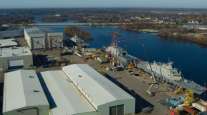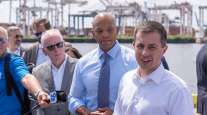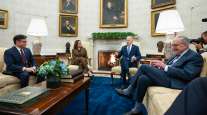Senior Reporter
Trump’s P3 Support Concerns Anti-Toll Group

An infrastructure funding measure reliant on private capital coming from the Trump White House is worrisome to the country’s top anti-tolling group.
The Alliance for Toll-Free Interstates, a coalition of carriers and businesses, is mobilizing against highway funding plans that advance tolls nationwide, especially ones on existing interstates, Stephanie Kane, the group’s spokesperson, said on Transport Topics’ Newsmakers on Feb. 17. She is expecting a busy year fending off federal and state proposals.
“ATFI is very concerned about the potential of proliferation of tolls in order to bring about these P3s, which Trump seems so intent on using to rebuild America,” Kane said.
“When a toll goes up, that means that the cost of delivering goods on that road goes up, and the natural progression is that all of those new costs for the trucking company, or for the retailer, the convenience store, the roadside rest stop or the restaurant, they’re just going to pass those costs directly on to consumers,” Kane explained. “So drivers are still paying for that road, in essence, twice through their fuel taxes and again through their toll. It’s just an underhanded way to tax people for that.”
The group’s members include the National Council of Chain Restaurants, the National Association of Truck Stop Operators, and American Trucking Associations. Chris Spear, ATA’s president and CEO said his group will push back on proposals of tolling existing roads and bridges. Under current law, states looking to add tolls along new highway lanes need an exemption.
On Capitol Hill, Republican lawmakers representing rural districts criticized a public-private strategy for rebuilding infrastructure projects. They argue rural regions lack enough traffic to draw interest from investors looking to set up toll projects.
Republican leaders and President Trump have yet to say when they intend to unveil an infrastructure funding package. Trump pledged to advance a measure during his first 100 days in office that would generate a $1 trillion investment in infrastructure over a decade by providing tax credits to investors.




